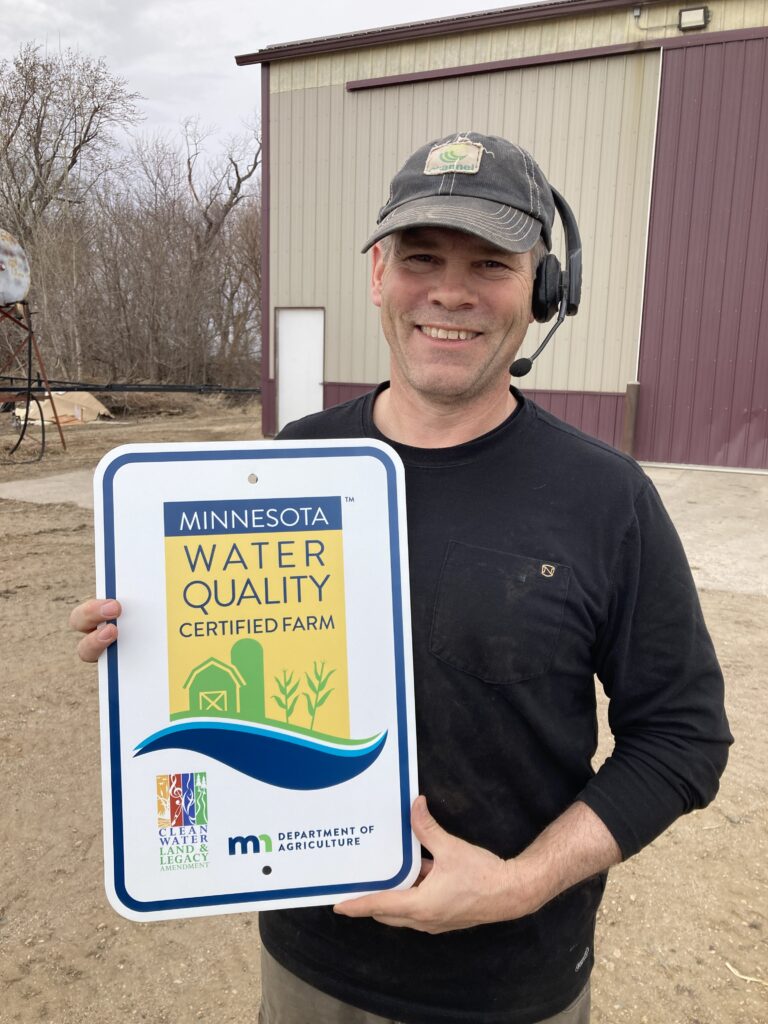Newest Water Quality Certified Farmer – Mark Portner

Location: Farms in Prairieville and Stark townships
Scope of operation: Corn/Soybean/Wheat rotation, regeneratively managed, working livestock into the rotation on crop land to increase diversity
Why did you choose to apply?
Mark met Herman Bartsch, South Central Area Certification Specialist for the Ag Water Quality Certification Program, at a meeting and talked with him about the possibilities of his farm being eligible for certification, being that he had been implementing cover crops and no-till for some time. He also appreciates the fact that being certified would provide him with a 10-year certainty for any new laws or rules that are implemented for water quality.
What are your main resource concerns on your property?
- Drainage/rainwater infiltration in heavy rain events, having more resilient land in damaging storms.
- Increase organic matter in the soil.
How do these affect your water quality?
- Reduce sediment loss by keeping a living root in the soil.
- Maintaining a healthy carbon nitrogen ratio to help keep the soil microbiology happy.
- Water infiltrates better into the soil due to improved soil structure, and can be utilized by crops, instead of ponding in lowlands.
What conservation practices have you implemented on your land?
- No-till on all acres.
- Cover Crops planted on all acres post-harvest.
- Decreased use of synthetic fertilizers and eliminated the use of synthetic P and K fertilizers.
- Manure application rate and placement are managed carefully to protect surface water.
Why did you choose to implement these practices?
- Originally the implementation was a way to save time and money. This led to Mark being more conscientious of his surroundings and looking for ways to help leave the soil better than he found it for the next generations and increase the land’s value.
Have you seen changes in your land since implementing these practices?
- Since implementation of these practices Mark has seen an increase of 1.5 – 2% Organic Matter across all his land. He has seen fewer gullies and reduced run-off in his fields which are softer and yet firmer. He has more flexibility when trying to get into the field in the spring and fall because of the improved soil structure. Additionally, he has significantly fewer rocks in the field. Mark has also noticed a decrease in weed pressure and has had to use less herbicide, which has also reduced his input costs.
What are your goals for the future to continue to improve your land and water quality?
- Mark’s main goal is to never stop learning and continually find ways to help improve his land. He values the ability to network and meet with people who are also looking for ways to improve the health of their soil and the chance to learn from one another. Mark tries to always keep an open mind, be observant, and learn from what mother nature is trying to tell him.
MAWQCP Summary
MN Ag Water Quality Certification Program is a program that works to recognize farmers and landowners who are working hard to protect our waters here in MN. Farms are assessed on their different management practices and conservation efforts. Becoming certified offers farmers regulatory certainty that they are considered compliant with any new water quality rules and laws implemented by Minnesota during their 10-year certification period. Farmers are also considered eligible for different financial assistance grants and scholarships.
If you are interested in becoming a water quality certified farm, please contact Isabella Portner at your local Soil and Water Conservation District, Brown SWCD, at 507-794-2553 ext0022.